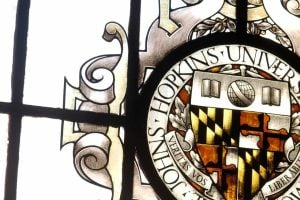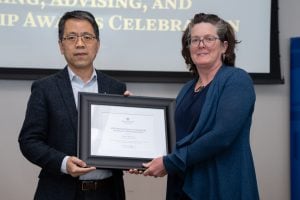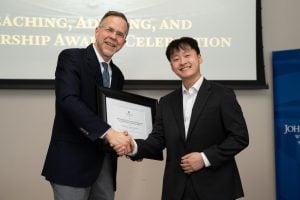
Two members of the Department of Materials Science and Engineering were honored with Whiting School of Engineering Teaching, Advising, and Mentoring Awards this year. Orla Wilson, an associate teaching professor and director of department undergraduate studies, received the Whiting School of Engineering Award for Excellence in Mentoring, and Huyn Sang (Harrison) Park, a graduate student, was recognized with a George M.L. Sommerman Engineering Graduate Teaching Assistant Award. They accepted their awards in a ceremony on April 1.

Professor Hai-Quan Mao (left) presenting the award to Orla Wilson.
Orla Wilson
Wilson has mentored many students during her 16 years at Hopkins.
“I view mentoring as a dynamic relationship in which I get to know every student and understand their goals,” says Wilson. “I allow my students to get to know me so that I can be an inspiring role model. My background helps me to connect with many types of students and I use this to advance my mentor-mentee relationships,” she says.
Wilson focuses her mentorship on students who enter college without knowing exactly what they want to do after they graduate.
“I suggest they work on what is right in front of them and not worry about the five- or 10-year plan yet. Then, I push them to pay attention to what is in their periphery as that is likely where the next big achievable opportunity might show up,” she says.

Professor Todd Hufnagel (left) presenting the award to Harrison Park.
Harrison Park
Park is a second-year grad student advised by Professor Todd Hufnagel. He was a teaching assistant for Hufnagel’s Structures of Materials class, a graduate course that explores material structures through advanced math concepts.
“I enjoyed finding different ways to help students develop intuition for abstract math concepts,” he says.
He recalls moments when students’ diverse educational backgrounds challenged him to find the clearest ways to explain tough mathematical theories.
“Moments like this quickly made me realize that concepts were often difficult to students because they might not fully understand their learning gaps, which can make students afraid to ask questions because they feel they should already know the material, especially if they don’t know where other students stand,” he says.
This caused him to shift his focus as a TA, discovering that he enjoyed finding new ways to help students learn. In the process, he deepened his own understanding as a PhD student.
“Explaining these ideas not only deepened my understanding but also enhanced my ability to manipulate the mathematical frameworks behind Structures of Materials, which is hugely helpful to my research in X-ray crystallography,” he says.